
AlphaLISA SureFire Ultra Human Total JNK1/2 Detection Kit, 100 Assay Points
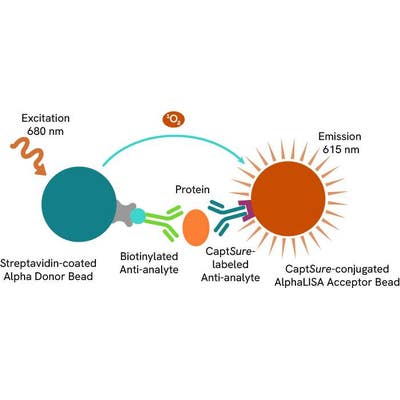
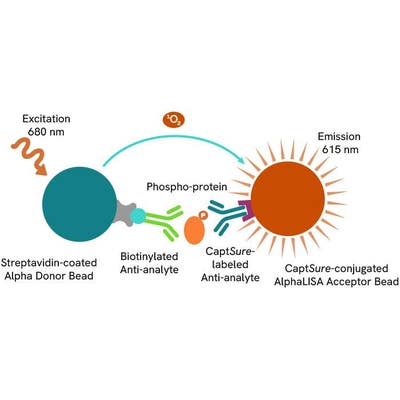
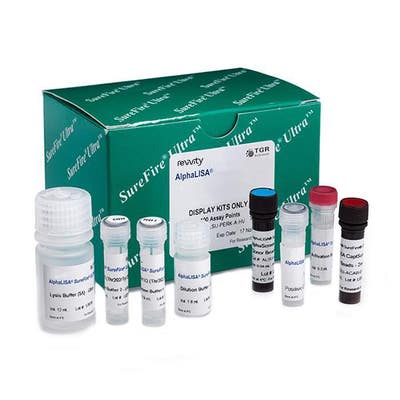 View All
View All
AlphaLISA SureFire Ultra Human Total JNK1/2 Detection Kit, 100 Assay Points
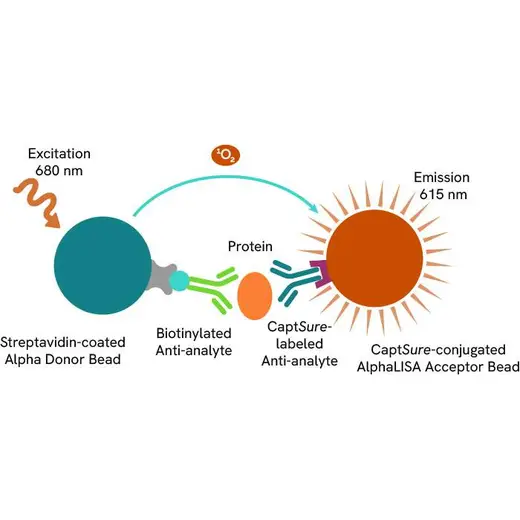
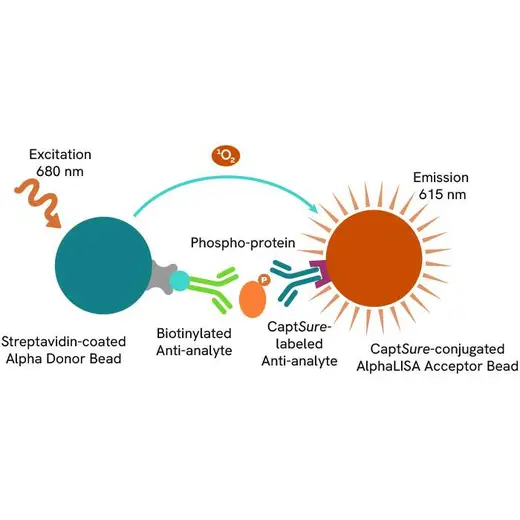
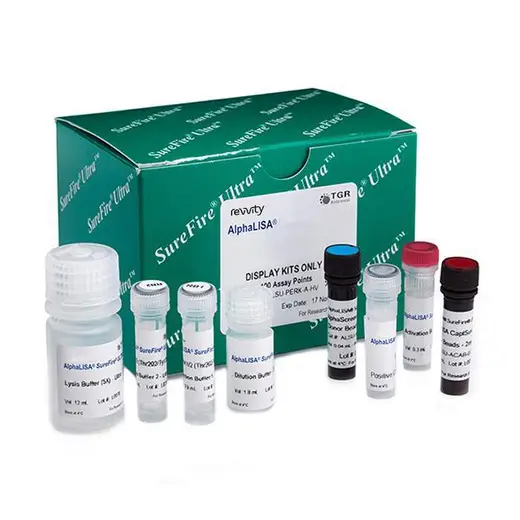




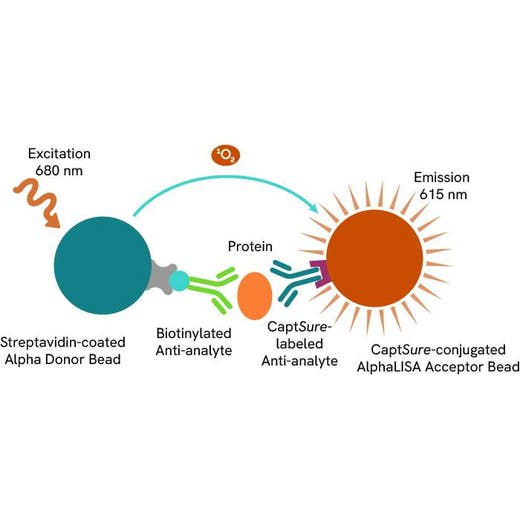
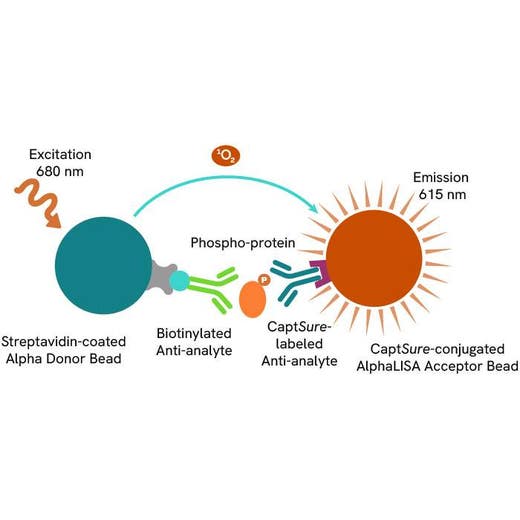
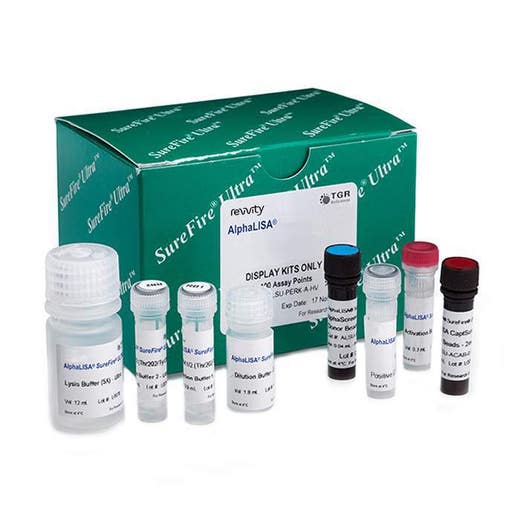




The AlphaLISA™ SureFire® Ultra™ total JNK1/2 assay is a sandwich immunoassay for quantitative detection of JNK1/2 (phosphorylated and non-phosphorylated) in cellular lysates using Alpha Technology. This assay is intended to be a normalization phosphorylation studies.
For research use only. Not for use in diagnostic procedures. All products to be used in accordance with applicable laws and regulations including without limitation, consumption and disposal requirements under European REACH regulations (EC 1907/2006).
| Feature | Specification |
|---|---|
| Application | Cell Signaling |
| Sample Volume | 30 µL |
The AlphaLISA™ SureFire® Ultra™ total JNK1/2 assay is a sandwich immunoassay for quantitative detection of JNK1/2 (phosphorylated and non-phosphorylated) in cellular lysates using Alpha Technology. This assay is intended to be a normalization phosphorylation studies.
For research use only. Not for use in diagnostic procedures. All products to be used in accordance with applicable laws and regulations including without limitation, consumption and disposal requirements under European REACH regulations (EC 1907/2006).







AlphaLISA SureFire Ultra Human Total JNK1/2 Detection Kit, 100 Assay Points







AlphaLISA SureFire Ultra Human Total JNK1/2 Detection Kit, 100 Assay Points







Product information
Overview
The AlphaLISA™ SureFire® Ultra™ total JNK1/2 assay is a sandwich immunoassay for quantitative detection of total JNK1/2 (phosphorylated and non-phosphorylated) in cellular lysates using Alpha Technology.
Formats:
- The HV (high volume) kit contains reagents to run 100 wells in 96-well format, using a 60 μL reaction volume.
- The 500-point kit contains enough reagents to run 500 wells in 384-well format, using a 20 μL reaction volume.
- The 10,000-point kit contains enough reagents to run 10,000 wells in 384-well format, using a 20 μL reaction volume.
- The 50,000-point kit contains enough reagents to run 50,000 wells in 384-well format, using a 20 μL reaction volume.
In the AlphaLISA SureFire Ultra assay, Donor beads are coated with streptavidin to capture one of the antibodies, which is biotinylated. Acceptor beads are coated with a proprietary CaptSure™ agent that immobilizes the other antibody, labeled with a CaptSure tag. In the presence of target protein, the two antibodies bring the Donor and Acceptor beads close together, generating signal. The amount of light emission is directly proportional to the amount of protein present in the sample.
AlphaLISA SureFire Ultra kits are compatible with:
- Cell and tissue lysates
- Antibody modulators
- Biotherapeutic antibodies
Alpha SureFire kits can be used for:
- Cellular kinase assays
- Receptor activation studies
- Screening
Specifications
| Application |
Cell Signaling
|
|---|---|
| Automation Compatible |
Yes
|
| Brand |
AlphaLISA SureFire Ultra
|
| Detection Modality |
Alpha
|
| Lysis Buffer Compatibility |
Lysis Buffer
|
| Molecular Modification |
Total
|
| Product Group |
Kit
|
| Sample Volume |
30 µL
|
| Shipping Conditions |
Shipped in Blue Ice
|
| Target |
JNK1/2
|
| Target Class |
Phosphoproteins
|
| Target Species |
Human
|
| Technology |
Alpha
|
| Therapeutic Area |
Central Nervous System
Metabolic
|
| Unit Size |
100 Assay Points
|
Image gallery






AlphaLISA SureFire Ultra Human Total JNK1/2 Detection Kit, 100 Assay Points






AlphaLISA SureFire Ultra Human Total JNK1/2 Detection Kit, 100 Assay Points






Video gallery

AlphaLISA SureFire Ultra Human Total JNK1/2 Detection Kit, 100 Assay Points

AlphaLISA SureFire Ultra Human Total JNK1/2 Detection Kit, 100 Assay Points

Resources
Are you looking for resources, click on the resource type to explore further.
This guide outlines further possible optimization of cellular and immunoassay parameters to ensure the best possible results are...
Emerging pathways to neuroinflammation and neurodegeneration
Neurodegenerative diseases, such as amyotrophic lateral sclerosis...
An in-depth review of molecular and cellular pathways
The maintenance of proteostasis, the biological mechanisms that control the...


How can we help you?
We are here to answer your questions.






























